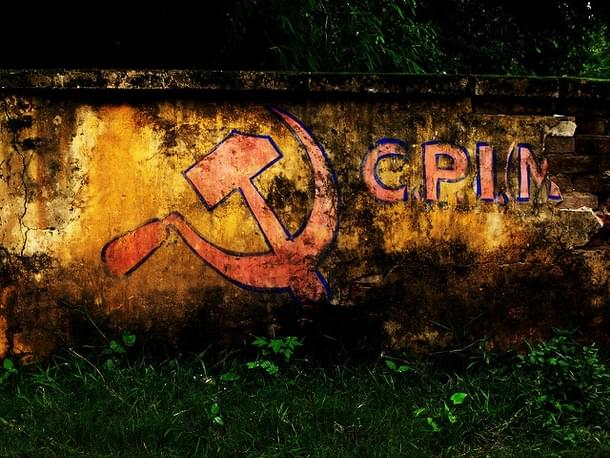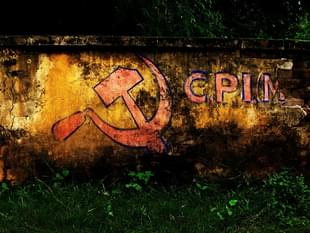Magazine
Very Good Riddance
Shanthu Shantharam
Apr 09, 2018, 04:11 PM | Updated 04:11 PM IST
Save & read from anywhere!
Bookmark stories for easy access on any device or the Swarajya app.


It is a sad state of affairs for India’s leftist parties. They are gasping for breath after losing their long-held bastion Tripura. Communism, which seemed to have engulfed one-third of the world by the mid-1900s dissipated by the end of the century; people simply could not stand it anymore. However, we still have vestiges of communism in small countries like North Korea, Laos, and to some extent in Cuba. China is the only large country that has strong one-party communism politically, and it survives only because it adopted a market economy that allows people to become rich. After the break-up of the Soviet Union, Russia has developed its own form of sham electoral democracy. Xi Jinping and Vladimir Putin have ensured that they will rule until they breathe their last, which is merely another form of leftist dictatorship.
Indian communists are a unique species, taking inspiration, off and on, from China and Russia, steadfastly oblivious to global change. Communism has never been able to take deep root in Indian soil because whatever godless political philosophy the communists propagate does not hold water amongst a populace that has been deeply religious and spiritual for millennia. Historian Kiran Mitra, in his book Marxism in India: From Decline to Debacle, says that the reasons for the communists’ failure are flawed advice from abroad, challenges from within the country, and their own incompetence. Today, they have been practically wiped out in Parliament. Mamata Banerjee dealt a deathblow to them in West Bengal. One hopes that their days in Kerala too are numbered.
The truth is that no matter how noble communism’s aims and principles are, they all go against the basic human desire to lead a quality life with material comforts. The Russians or the Chinese were hardly communists by nature; they had communism forced upon them. And any political ideology that is forced upon people is eventually bound to fail. After having been in power for decades, the communists lost in West Bengal and Tripura because they could neither make a dent in poverty, nor did they allow these states to grow economically.
Today, the leftist statist view of socialism based on the antiquated Soviet model is a joke. The centralism of the parties prevents their cadre from engaging in critical self-reflection and policy debates within the parties. Communists need to recognise India’s millennia-old social and cultural aspects of its people, which they refuse to do. What is awaited now is their complete decimation.
Communist presence on university campuses too has dwindled considerably, save for Jawaharlal Nehru University and Jadavpur University. Today, through the free flow of information and social media, the youth can easily get to know of communist cruelty and misdeeds across the world. Post liberalisation and globalisation that have ushered in growth and prosperity for millions of Indians, the worn-out communist philosophy attracts very few. The Maoists have isolated themselves in the jungles and their dream of capturing power through guns looks hopeless. In Kerala, communists still threaten opponents with violence, even murder, but atrocities cannot be hidden these days, thanks to 24X7 news channels and social media.
India’s communists are also opposed to progress in science and technology so long as it does not bring social equality. Even though modern China has embraced 21st century science and technology for its economic progress, Indian communists, who otherwise seek inspiration from China, shun them in India. They refuse to accept modern biotechnology in agriculture and medicine. There was a ray of hope when Buddhadeb Bhattacharya succeeded Jyoti Basu in West Bengal. Bhattacharya had seen how China and Vietnam were making fantastic progress economically and was hoping to do the same in India. But his comrades let him down by not supporting him. When Dr Asim Dasgupta, an MIT-trained economist, was ready to hear the scientific merits of modern biotechnology in agriculture, his party told him to stop. It is unfortunate that such brilliant minds in the party were suppressed by the Politburo, which deprived Bengal’s farmers of the benefits of modern science. Kerala’s communists went one step further by declaring Kerala a non-GMO (genetically modified organism) state.
Communist ideology had promised to overthrow capitalism, but instead got routed within a hundred years. The Russian Revolution took place in 1917. By 1989, most countries had cast off communism entirely or pushed it discreetly aside in pursuit of business and trade. What was supposed to free the poor and the working classes from exploitation by the rich ended up being just another form of exploitation. Government ownership of all property meant that no one had any incentive to work hard and produce more than the minimum that one could get away with. The governance system became a one-party dictatorship, leading to massive corruption. Party leaders enriched themselves and lived in great style, while the poor continued to suffer. The joke was that in capitalism, people exploit people, while in communism, it was exactly the other way round. In the meantime, it was becoming too expensive for government to control everything and every aspect of people’s lives. In the Soviet Union, the government started to let go of some things slowly, but once the doors were opened even slightly, they could not be shut — in fact, people forced them ajar. Events gathered momentum rapidly, and the story was soon over.
This is exactly what happened in India as well. Once Narasimha Rao and Manmohan Singh started the process of market liberalisation, the free spirit of Indians tasted the economic blood of prosperity and there was no going back. That knocked down all the principles of communism, that even to this day, the communists have failed to recognise. Preaching godlessness to Indians is another whammy that the Indian people would never take from anybody. Spiritualism and religiosity are deeply embedded concepts in Indian civilisation, and communists never understood this, and went on preaching against religion like Lenin and Stalin did in Russia.
Russians did not take it then, and Indians would not take it now.
Indian communists have also lost a whole cadre of top notch leaders like E M S Namboodaripad, Jyoti Basu, Harkishan Singh Surjeet and Indrajit Gupta. The present leadership is totally non-charismatic. Their intellectual arrogance also works against the communists. They believe that there is only one type of intellectualism and that is left intellectualism. In fact, leftists, by default, were “intellectuals” and “progressives”. They looked upon conservatives and right wingers with a sense of disdain that infuriated them. This is one of the reasons why the educated middle class voted so overwhelmingly for Narendra Modi in 2014. It was a long time coming.
Globalisation and the emergence of a massive middle class rang the death knell for the communist parties in India. Today’s ambitious, technologically savvy youth have no time for communism or socialism; these ideologies fail completely to resonate with them. Communists lost the older generation to caste, religion and spirituality, and the younger generation to the technologically speeding world. Indian communists are a lost cause, and unless they turn their principles inside out, they have no chance of raising their heads again. India did not and does not deserve communism. Billions of Indians have suffered in poverty for long. They need a respite and communism certainly cannot provide it.
Shanthu Shantharam is a Professor of Biotechnology at the University of Maryland-Eastern Shore. A former biotechnology regulator with the United States Department of Agriculture, Dr. Shantharam has served as a consultant to UN-FAO, UNIDO, World Bank, and Asian Development Bank. He was responsible for initiating the development of India’s biotech regulations in the early 1990s when he was a Fulbright Scholar at the Indian Agricultural Research Institute.





